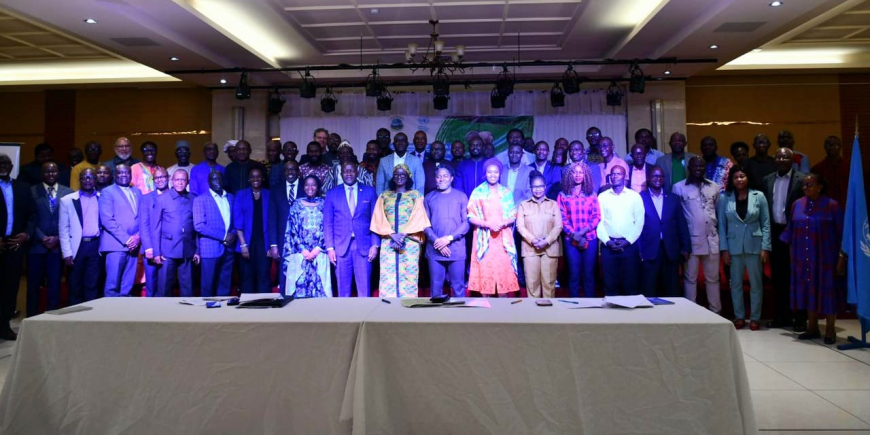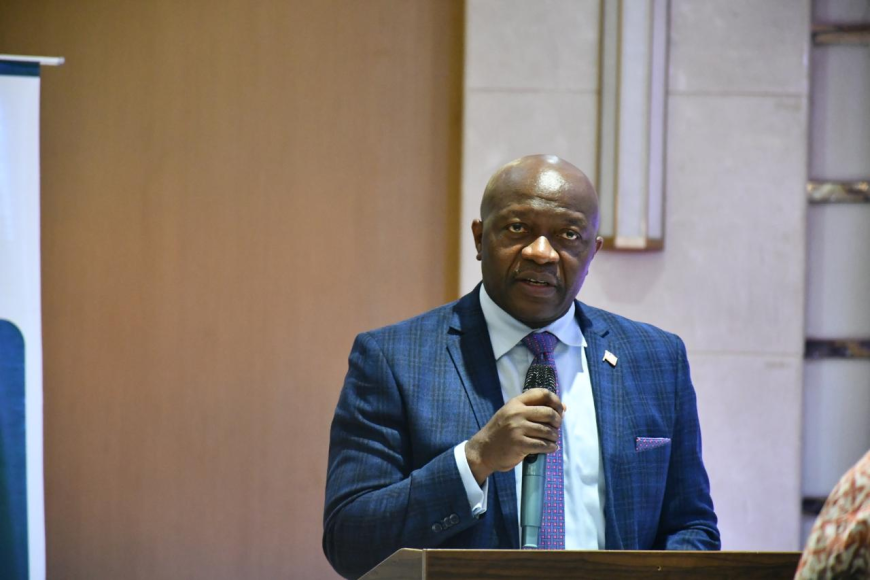Government Unveils 2025 Budget to Propel Liberia Toward Sustainable and Inclusive Development"

Monrovia Liberia: The Government of Liberia has unveiled the 2025 draft national budget, strategically aligned with the African Agenda for Inclusive Development (AAID) and County Development Agendas (CDAs) to spearhead transformative growth across the nation.

Liberia Finance Minister Augustine Ngafuan 2024
Speaking at a government-UN strategic policy dialogue, Minister of Finance and Development Planning, Augustine Ngafuan, announced a $106 million allocation for public sector programs under the AAID and CDAs, with plans to increase funding as fiscal space broadens.
The AAID, central to Liberia’s national development strategy, is structured around six transformative pillars, each tied to specific policy goals. These pillars are:
1. Economic Transformation: Aimed at building a competitive, diversified, inclusive, and resilient economy driven by the private sector.
2. Infrastructure Development: Focused on creating modern, reliable, inclusive, and climate-resilient infrastructure to support sustainable economic growth.
3. Rule of Law: Aims to establish a just and accountable legal framework that protects rights, promotes good governance, and fosters a stable development environment.
4. Governance and Anti-Corruption: Prioritizes building effective institutions that ensure value for money in service delivery, combat corruption, and deepen decentralized governance.
5. Environmental Sustainability: Promotes responsible natural resource management, biodiversity conservation, and resilience to climate change while fulfilling Liberia’s national contributions to global climate action.
6. Human Capital Development: Focuses on developing a skilled, knowledgeable, healthy, and empowered population to drive sustainable and inclusive socio-economic progress.
Minister Ngafuan highlighted that with the AAID and CDAs finalized, the government is poised to launch and commence implementation in January 2025. However, he emphasized the need for increased international support during this critical phase.
The strategic policy dialogue, held in collaboration with the United Nations, marked a milestone in Liberia’s development journey. The dialogue brought together senior leadership from the government and the UN to align priorities for the next UN-Government Cooperation Framework.
With more than two decades of sustained peace, democratic governance, and incremental progress, Liberia is at a historic crossroads. The nation has set its sights on achieving middle-income status through its ambitious national development plan, which aligns with the Sustainable Development Goals (SDGs).
Recognizing the challenges of achieving the SDGs, Minister Ngafuan reiterated Liberia’s commitment to working with the UN and other partners to fast-track progress. The high-level dialogue underscores a shared commitment to advancing Liberia’s aspirations for sustainable and inclusive development.
As Liberia embarks on this transformative journey, the government remains optimistic about leveraging strategic partnerships to achieve its ambitious development goals.
The Finance Minister has revealed a comprehensive development agenda under the Accelerated and Inclusive Development Initiative (AAID). The initiative adopts critical focus areas to drive socio-economic transformation, emphasizing agribusiness, roads, infrastructure, rule of law, education, sanitation, and tourism. These priorities aim to propel Liberia's developmental trajectory while addressing gender equality, youth empowerment, vulnerable groups, and climate change as key factors shaping policy decisions.
The minister highlighted the alignment of the national development plan with the Sustainable Development Goals (SDGs) and the African Union’s Agenda 2063. Notably, 83% of the interventions align with the SDGs. Among the top-aligned goals are SDG 8 (Decent Work and Economic Growth), SDG 4 (Quality Education), and SDG 16 (Peace, Justice, and Strong Institutions).
Education emerged as a top transitional investment priority, followed by digital connectivity, job creation, and social protection. The total estimated cost of the AAID stands at $8.4 billion, with $2.43 billion allocated to capital investments in health and education. This reflects a long-term commitment to building a skilled and productive workforce, constituting 29% of the total funding.
Infrastructure development, a cornerstone for connectivity and growth, is estimated at $2.13 billion, representing 25.5% of the financing. This includes vital investments in energy, roads, ICT, water, and logistics to bolster economic transformation.
Economic transformation, focused on job creation and diversifying the economy, accounts for 20% of the funding. Governance, rule of law, anti-corruption, and environmental sustainability are also integral, receiving 11.2%, 8.3%, and 5% of the funding, respectively.
The minister underscored the government’s dedication to aligning Liberia's developmental goals with global benchmarks and fostering inclusive growth through strategic investments. This ambitious plan lays the foundation for a robust economy, improved governance, and sustainable development for the nation.
Also speaking at the dialogue the UN Resident Coordinator underscored the importance of unity, commitment, and innovative thinking in Liberia’s journey toward sustainable development. Addressing key stakeholders, including government officials and UN representatives, the Resident Coordinator emphasized the pivotal moment Liberia finds itself in, as the country works to overcome challenges and capitalize on opportunities.
The Resident Coordinator, drawing from personal experience in conflict-affected countries such as Zimbabwe, Eritrea, and Rwanda, reminded attendees of the importance of perspective in policy-making. "We must remember the context in which we operate—a Liberia emerging from a history marked by challenges but also one filled with immense potential," the Coordinator stated. The message was clear: while the road to development may be fraught with setbacks, clear direction and hope are essential for progress.
Highlighting the relevance of global frameworks, the UN Resident Coordinator called for policies that align with Liberia’s national aspirations and contribute to the achievement of the 2030 Agenda for Sustainable Development and the Sustainable Development Goals (SDGs). With only 17% of SDG targets on track globally due to intersecting crises like climate change and geopolitical instability, there was a strong call for accelerated action.
"Peace thrives on shared prosperity," the Coordinator said, emphasizing that the journey toward rebuilding and transformation demands inclusive, people-centered policies that prioritize social equity, economic growth, and environmental sustainability.
The dialogue centered around Liberia’s National Development Plan (NDP), particularly the ARREST Agenda for Inclusive Development (AAID), a five-year roadmap that aims to chart Liberia’s progress toward sustainable development. Liberia’s progress in key SDGs, including a 31% reduction in maternal mortality, gender parity in education, and a commitment to reducing carbon emissions by 64%, were highlighted as successes that demonstrate the country’s potential for transformative change.
However, the Resident Coordinator acknowledged the significant challenges that remain, including high poverty rates, gender inequality, and underinvestment in critical sectors like agriculture and health. "External shocks, from the COVID-19 pandemic to global economic disruptions, have further hampered progress," the Coordinator noted, calling for enhanced resilience in the face of adversity.
The aim of today’s dialogue was clear: to ensure that strategic priorities and development efforts are grounded in the needs and aspirations of the Liberian people. The UN’s 21 agencies operating in Liberia, working in partnership with the government, are committed to delivering tangible results that benefit all Liberians. By fostering mutual accountability and strategic coordination, the UN’s engagement in Liberia aims to accelerate progress towards the SDGs while ensuring no one is left behind.
In his concluding remarks, the Resident Coordinator stressed the importance of solidarity, mutual respect, and accountability in achieving Liberia’s goals. "The UN has been here before, is here now, and will continue to be here in the future," he affirmed. With the strong commitment from both the government and the UN, the dialogue set the stage for actionable outcomes that will guide Liberia’s transformative path toward a resilient, sustainable future.
Liberia remains poised to build on its achievements and overcome the hurdles in its path, as the government and UN partners work together to ensure that Liberia’s development is inclusive, resilient, and sustainable for generations to come.
What's Your Reaction?








































































